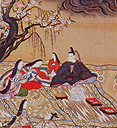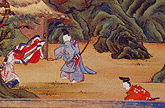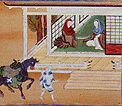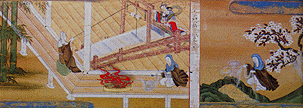
1. Chiisakobe-no Sugaru: tale of catching the thunder (from Nihon Ryôi-ki, edited in the 8th Century)
2. A legend of Princess Chûjô (from Otogi Zôshi, edited in the 17th century)
3. A man who married a vixen (dans Nihon Ryôi-ki)
Once upon a time, in Nara, one beautiful princess named Hase lived. Her
father Toyonari Fujiwara was a minister. Her mother, Murasakinomae died
when Hase was 5 years old. Thus, her father remarried when she reached 7
years old.
 Her mother-in-law, Teruhinomae had a good-looking face,
but her heart was perverse.
Her mother-in-law, Teruhinomae had a good-looking face,
but her heart was perverse.
Princess Hase was so beautiful and so gentle that everybody loved her.
The spiteful mother-in-law hated her because of her grace and her tenderness.
Teruhinomae charged too many harsh works to Princess Hase. And she behaved
heartlessly to Princess Hase. But Princess Hase acceded to her orders and
followed her with a warm heart at any time.
When princess Hase was 13 years old, the king (the master of her father)
got a sick. The king ordered to princess Hase.
"Hase, I can't sleep well because of the big splashy sound of running
water. Your ears caught the murmuring of running water, didn't you? Hase,
I understand that you are very good poetess, so, compose one poem for the
god of the river. Lead calm the river sound."
The princess Hase answered. "Yes my lord, I'll compose a poem and I'll
sing it." She composed one poem immediately.
The river Tatsuta, listen to me.
You make your waves so roaring.
Please lead it to be calm and make the sound of water tender
Blow away worries of my lord. Please!
Just then, the loud sound and a swell of the water became quiet down.
The king was satisfied very much. He gave her better grade "Chûjô".
From this time, the princess Hase was called "Chûjô-Hime"
(Princess Chûjô).
On the other hand, her mother-in-law was discontent to know it. She detested
Princess Chûjô. She began to raise a hate more than more. Her
flames of hate toward Chûjô-Hime burned into flames.
One day, Teruhinomae gave one order to her servant. "Kill! Kill her!
Take her away to Hibari-yama (the skylark mountain) and then kill her!"
The servant took her away to the mountain against his heart. He could not
kill her, because she was so beautiful and so sympathetic. The servant said,
"Listen to me princess Chûjô. From your mother-in-law,
I was given one order of killing you, but it's impossible for me! I never
can kill you, absolutely can't!"
Princess Chûjô said, "I've got it. It's not your fault.
It's mine, it's my fault undoubtedly. Tell to my mother-in-law that you
surely killed me." After saying, she bowed her head down disappointedly.
The servant said, "Oh, no! I can't leave you alone in such mountain
lone. I'll stay here and I'll protect you. My wife and I will take care
of you."
Then the servant cut trees in the forest and constructed a simple house
with a roof made of miscanthus. These three persons lived ensemble in the
lonely mountain Hibari-yama. A couple of servants cut down trees, picked
wild flowers and gathered them. They brought them to the foot of the mountain
for sale. They earned a little money to bring her up.
"How poor my princess! If you were in the city, you could spend your
time happily. Your mother-in-law, Teruhinomae is really terrible."
A couple of servants looked at each other's eyes filled with tears. Princess
Chûjô said, "Don't be in sorrow, please. Thank a lot, I'm
living peacefully like this."
Princess Chûjô gathered brushwood, drew water form a torrent,
though these were inexperienced works for her. After these works, Princess
Chûjô passed her time peacefully reading Holy book of Buddhism.
Meanwhile, in the capital, the minister, her father, came back to his house.
His wife Teruhinomae said to him, "My darling, I think that your daughter
Chûjô is a kind of girl depraved. She always frolicking with
hooligans." The father of Princess Chûjô got out of humor
to get her report. His heart was hurt so much. He said, "Turn her out!
Drive her away immediately! A woman like her is no longer my daughter."
Teruhinomae said in her mind, "I did! I won!"
She got on talking. "Darling, I abandoned her in Hibari-yama. I ordered
my servant to do it." The minister, the father said, "Perfect!
That's all. I never want to see her face, never!" He was taken in her
story.
 After some days, the minister went hunting. In the mountain, when he
had run about handing bows and arrow in company with his servants, he found
a hut. He looked it with suspicious feeling. And, inside the hut, he saw
one beautiful girl reading a Holy book of Buddhism. "Oh, you! You are......!"
The father cried in surprise.
After some days, the minister went hunting. In the mountain, when he
had run about handing bows and arrow in company with his servants, he found
a hut. He looked it with suspicious feeling. And, inside the hut, he saw
one beautiful girl reading a Holy book of Buddhism. "Oh, you! You are......!"
The father cried in surprise.
Princess Chûjô turned her head with big amazement. "My
God! My Papa!......" She rushed forward in her father's arms.
Then, her father said to her, "Go to the devil! Like you, a woman prostituted!
No longer my daughter, you are!" "Why not?" she asked to
her father. He told her the report of Teruhinomae.
"Alas! How misery! It's not true!" Princess Chûjô
was on the verge of tears. She began to weep.
Here, the servant and his wife came back from the mountain. They told him
the fact all in detail. The father of Princess Chûjô got it,
and he said in deep emotion, "Ah! Pardon me, my flower! I've understood."
He hold her tightly in his arms.
Thus, Princess Chûjô came back to the capital with her father.
But she didn't want to see her mother-in-law any more. Her mother-in-law,
Teruhinomae heard this incident. She felt shame at her behaviors which were
cruel to Princess Chûjô. She threw herself into the pond.
Princess Chûjô decided to enter a nunnery. "I want to be
a pupil of Buddha and I want to see my deceased mother ." Her father
didn't accept her wish. However, she never changed her mind. Princess Chûjô
went to the temple Taima and passed through its gate. She became good nun.
"Help me, my sky, leading me to my mother. Guide me to the heaven,
please..."
 For the space of three years, she spent her time zealously
reciting prays Buddhist. One night of those days, two nuns came to see Princess
Chûjô. They said to her, "Gather a lot of threads of lotus
as much as possible and load them on the back of hundred camels." Princess
Chûjô gathered a lot of stems of lotus with her father's aid.
Another evening, two nuns visited her again. They began to spin the stems
into threads. The two nuns brought out these threads by the fountain in
front of the temple and rinsed the thread of lotus in the fountain.
For the space of three years, she spent her time zealously
reciting prays Buddhist. One night of those days, two nuns came to see Princess
Chûjô. They said to her, "Gather a lot of threads of lotus
as much as possible and load them on the back of hundred camels." Princess
Chûjô gathered a lot of stems of lotus with her father's aid.
Another evening, two nuns visited her again. They began to spin the stems
into threads. The two nuns brought out these threads by the fountain in
front of the temple and rinsed the thread of lotus in the fountain.
At that moment, the threads of lotus emitted a shine dazzling. These threads
of lotus were dyed in five colors. They were sparkling so magnificently.
Two nuns brought them into the temple. And they began to weave something
at the loom by their original ways.

A flash, the five-color threads has changed into one beautiful textile.
It was a twinkling textile! A shine of the morning entered the temple. Inside
the temple began to bright having the morning sunshine. When the interior
became more bright, two figures of nuns had vanished. "My God! Good
gracious! How beautiful it is!" Princess Chûjô was so impressed.
The shining textile was left here, which was woven by two nuns. This textile
of lotus existed clearly. It sparkled, gleamed, and shimmered.
She saw white lotus flowers in the motif of this textile. They were in full
bloom in the morning air. In that space, she found two celestials playing
on a flute and dancing on the white clouds. One celestial turned her eyes
to the direction of Princess Chûjô. The celestial looked at
her and veiled Princess Chûjô with her smile.
"Oh! My mother!" Princess Chûjô recognized her. After,
she kept silent, because she was touched amply. She admired this textile
of lotus for a long time as if she were in a dream. The voice of the nun
reached her ears. "Here, this is the country of Buddha, the Paradise:
Gokuraku that you wanted to see. Over there, she is in that place. She is
your mother. You can see your mother in the Paradise, can't you?" Princess
Chûjô said to her, "Thank you, thank you from my heart."
She prayed folding her hands and recited Buddhist scriptures.
At noon, it was flowery day in spring. Princess Chûjô had her age 28 years. She was waiting messengers from the sky. From the west sky tinged with violet, a light was approaching her and it reached her. Bosatsu (Bodhisattva) appeared. And in the evening, Princess Chûjô rose to the sky through the fragrant air, through the singing of celestials.
The temple Taima keeps "Mandara" of Princess Chûjô. Nowadays, people visit Temple Taima to pray and to admire a statue of Princess Chûjô.
The legend says that the "Taima Mandara" is a kind of textile woven out of lotus threads. This textile symbolize the grace, the kindness, and the forgiveness. People worshiped and loved this textile.
In the Kamakura era, 13th century, this story "A Tale of Princess Chûjô" was recorded. After 400 years, in the Muromachi and the Momoyama era (17C), this tale was re-collected in "Otogi Zôshi". "Otogi Zôshi" has the style Nara-ehon: a picture book of Nara. The tale of Princess Chûjô and her Mandara gave deep influence to the field of modern literature and also to the field of dramatic art, Nô, Kyôgen, Kabuki, and Bunraku.
Zeami arranged this story for his nô play, "Hibari-yama".
Nara prefecture keeps a large number of vestiges of ancient times. The temple Taima is also noted for beautiful peony flowers. May, June, these are seasons in full bloom of peony flowers. Shall we stroll on the beige road and walk along the whitish crumbling earthen wall? You can find two beautiful Sanjû-no-tôes (three-storied pagoda in 8th and 9th century) in the garden of temple Taima.
The original textile, Taima Mandara was woven out of silk in the 8th century. Textiles made of silk are called Tsuzureori. The original piece has a square form, 4m x 4m. But already it has been worn and ragged. Now we can see the reproduced one.
When I was a child, my mother told me this story: "Princess Chûjô and Holy Textile of Lotus" as a beautiful airy cradle.
Taima Mandara (Reproduction in the 16th century)
Taimadera Engi Emaki
Otogi Zôshi
Chûjô-hime Monogarari
HOME / History
of haiku / Haiku / Tanka
/ Profile
French
e-mail to Niji Fuyuno
loupe@big.or.jp